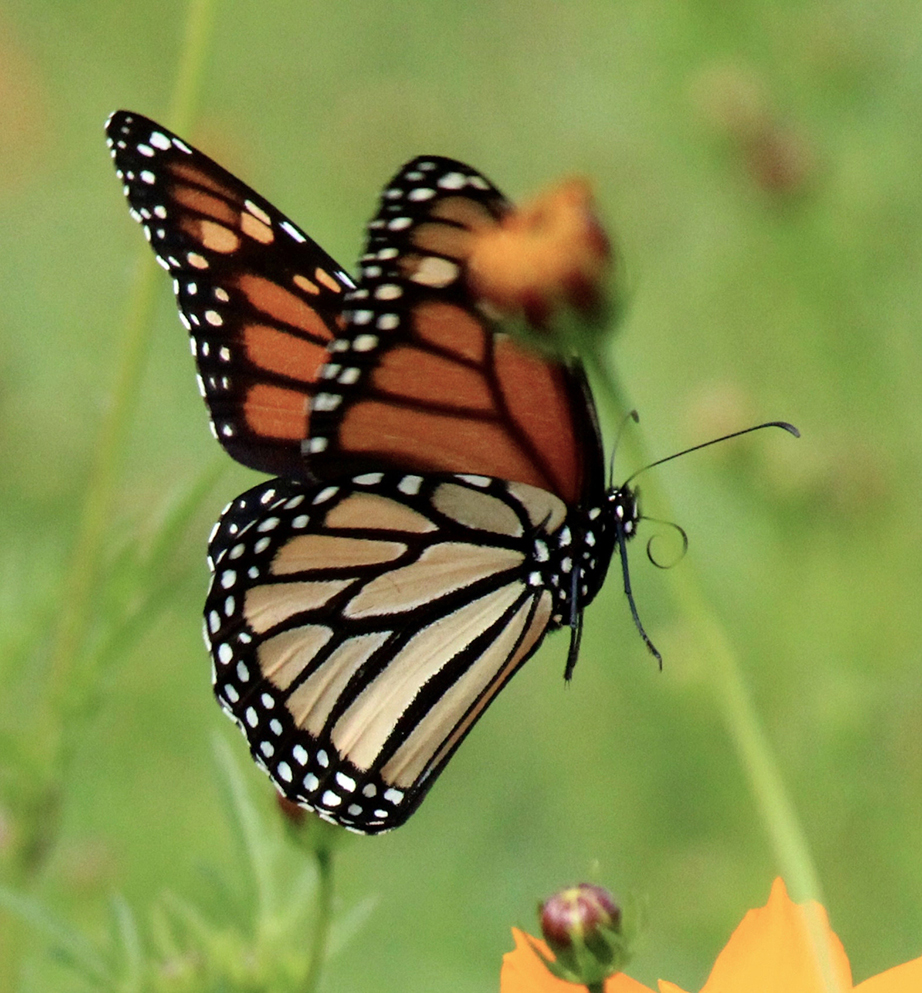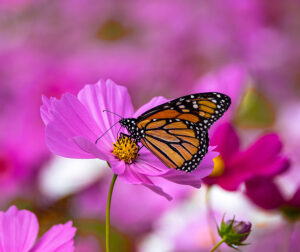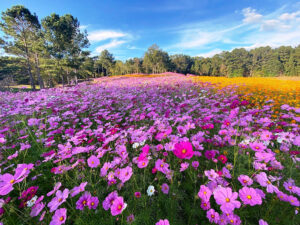
The International Union for Conservation of Nature (IUCN)—the world’s most comprehensive inventory of biological species’ global status—added the migratory monarch butterfly to its endangered list on July 21, 2022. Migratory monarch population has shrunk by between 22% and 72% over the past decade, according to IUNC, with a 26% decline just in 2021.
Jim Gibbs, owner/developer of Gibbs Gardens—concerned about the increased threat of extinction for these delicate creatures—decided to do something more to help. Gibbs just expanded his 2021 butterfly garden from three to 15 acres—giving migratory monarchs five times more habitat within Gibbs Gardens.
Habitat destruction is one of the biggest dangers facing migratory monarchs. Gibbs Gardens vast size—376 acres—and its totally natural environment create a uniquely protected habitat for butterflies. The Butterfly Garden was designed with shrubs as well as small and large trees to provide safe places for butterflies to explore and rest at night.
-

- Visitors to Gibbs Gardens took these amazing photos in Fall 2021 when the migratory monarchs stopped at the Butterfly Garden on their trip south to south west Mexico. Photos courtesy of Gibbs Gardens
-

- Jim Gibbs planted 15 acres of Cosmos this June to expand his Butterfly Garden from three to 15 acres.

Waves of yellow & orange Sulphureus Cosmos – shades of pinks and deep red Bipinnatus Cosmos cover the Wildflower Meadow.
Each year the monarchs migrate approximately 2,485 miles from their summer breeding grounds in Canada and New England, traveling south along the east coast then through north Georgia as the migration path veers west toward Texas and Mexico.
Every day these monarch butterflies need to find a safe place with the right food to fuel their migration. Flying up to two miles above the earth at about five miles an hour, Monarchs travel from 25 to 100 miles a day—and they don’t pack a lunch. Monarchs are “specialist” eaters—they only eat certain plants—and they need to be able to find them from 11,000 feet up.
“Color attracts the monarch butterflies, luring them down lower to find food sources,” says Jim Gibbs. “This June, to be ready for the monarchs, we planted 15 acres of colorful Cosmos in great wide swaths that wind through the gardens.” The effect—similar to highway drivers noticing a colorful billboard—catches the monarchs’ attention and draws them down to the garden.
The acres of blooming flowers in bright, vivid colors create a vibrant welcome mat to greet the monarchs. The Butterfly Garden has already attracted Eastern Black Swallowtail and Yellow Swallowtail butterflies. Monarch butterflies begin arriving in September through October as eastern and northern migratory monarchs travel toward their wintering destination. They arrive in southwestern Mexico by November.
Around April of next year, the migratory monarchs will reverse the process and head north to breed. Jim Gibbs will be ready for them. On November 15, he will start from scratch clearing out the fall flowers and begin planting poppies, larkspur, milkweed and other monarch delicacies for their return trip in April 2023.
Recognized as one of the Thirteen Best Botanical Gardens in America and named a top garden in Georgia by the Atlanta Journal Constitution, Gibbs Gardens always has something new in bloom. The five feature gardens and 21 seasonal collections gardens offer unique and continuous delights for garden lovers of all interests. To learn more about Gibbs Gardens go to gibbsgardens.com. For more information about monarch butterflies go to monarchjointventure.org.
SOURCE Gibbs Gardens


Bulloch Public Safety
10/08/2024 Booking Report for Bulloch County

Bulloch Public Safety
10/17/2024 Booking Report for Bulloch County

Bulloch Public Safety
10/21/2024 Booking Report for Bulloch County

Bulloch Public Safety
10/14/2024 Booking Report for Bulloch County

Bulloch Public Safety
09/25/2024 Booking Report for Bulloch County








